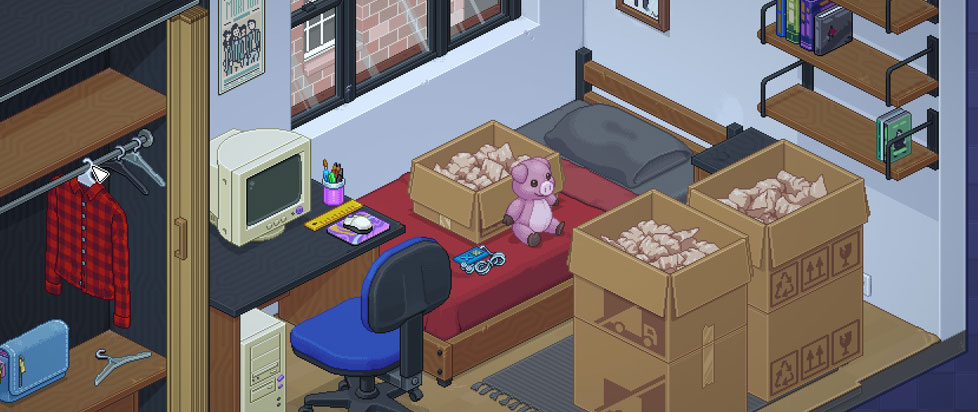
Unpacking Vulnerability, Empathy and Player Agency
When we talk about games, we often center ourselves. Whether the player character is meant to be an avatar, or something abstract like a tower, or an ambiguous hand of god, we tend to – as the agent interacting with the thing – identify ourselves at the heart of it. Maybe the story happens to the player character, but the action happens to me. Games that take place in intimate spaces like the home, however, don’t leave as much room for the player’s own self.
In Unpacking, you follow the main character through major milestones of their life by unpacking boxes of their belongings into their home – from their childhood bedroom in 1997, to student dorms, to the swings and roundabouts of adult independence. While you never see them, you learn who they are through their belongings and what they gain and lose across the years.
At the end of each level, when every box is empty, the game checks to see if everything is in the “right” place or not. Some are obvious – a hairdryer shouldn’t be kept in the sink – but others speak to a preference to have most things inside closed cupboards and shut drawers, which isn’t one I share. The first time those red error outlines told me, “no, you can’t have all these things out on top of the desk,” and “no, you can’t strategically place things on the floor,” I was surprised.
Of course, Unpacking isn’t about me. However much I might have in common with the character it surrounds – a terrible ex, a prevalence for collecting markers, at least one beloved plush animal – they aren’t supposed to be me. I can choose to stack books on shelves or order them by height to my own taste, but this is someone else’s narrative. It’s a story, not a sandbox.
It’s a reminder that I might be acting for the player character, but I don’t seamlessly occupy the same space as them. When I’m playing games with a grander scope of decision making, I’m not competing for mental space with the idea of the player character, but in an intimate setting, it would be impossible not to. I’m poring over someone else’s medicine cabinet, their toothbrush mug, the ephemera of their relationships and their childhood nostalgia. It takes a moment to think not, how do I want to decorate this space, but what might somebody else need of it?
Watching other people play Unpacking, then, is a whole new layer. More than intuiting what the character might want, or what the designers might have intended, those layers are seen through the lens of someone else’s lived experience. One where they prioritize color-coding the bookshelves, and beautifully lay out a table, but may not recognize a dish rack. It’s that moment when you walk down the street and realise that every single stranger, whose presence is fleeting in your life, has lived an entire history up until that moment. They have their own passions, their own relationships, their own spirituality and their own knick-knacks.
Unpacking doesn’t place you in someone else’s shoes – I don’t know that any game truly does. Instead, it reminds you, more than any immersive role-playing experience, that other people are walking miles in different shoes to yours. There’s room for my own interiority as I roleplay a space wizard, or an roguish elf, and I’m the affected agent when a tower gets destroyed in a strategy game, but the intimacy of the domestic space kicks me out of my own head. I can’t simultaneously acknowledge the vulnerability of the story, and be a stranger in its home.
Unpacking doesn’t set out to make you feel at odds – the puzzle layer, about putting things away “correctly,” is even optional – but the experience it narrates can’t be universal. The barrier in Unpacking is between your own complex inner life and the potential entirety of someone else’s, and not a mechanical one.
Ruth Cassidy is a writer and self-described velcro cyborg whose DMs are open for pictures of mountains & your cats. Direct them to twitter @velcrocyborg.





